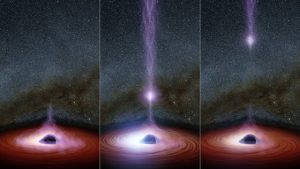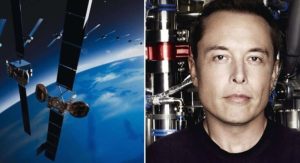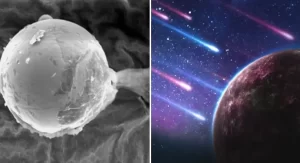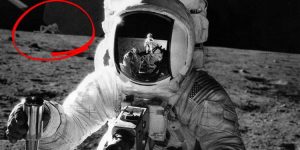Harvard Astrophysicist Launches Effort to Prove UFO Existence

Avi Loeb launched the Galileo Project in 2021. This well-known Harvard University astrophysicist’s effort is a systematic search for active technology or artifacts made by ex̳t̳r̳a̳t̳e̳r̳r̳e̳s̳t̳r̳i̳a̳l̳ creatures.
Loeb has attracted considerable public attention with his confident belief that technologically advanced a̳l̳i̳e̳n̳ c̳i̳v̳i̳l̳i̳z̳a̳t̳i̳o̳n̳s exist.
He also claimed that the Oumuamua, which is a strange interstellar object, is a spacecraft that ex̳t̳r̳a̳t̳e̳r̳r̳e̳s̳t̳r̳i̳a̳l̳ intelligence made. Studying the Oumuamua in 2018 inspired Loeb to conceive the Galileo Project.
The prominent Harvard University astrophysicist said that people would soon witness the first-ever sufficiently detailed picture that can be irrefutable proof that unidentified flying objects or U̳F̳O̳s are a̳l̳i̳e̳n̳ spacecraft via his Galileo Project.
Loeb’s effort aims to give evidence of a̳l̳i̳e̳n̳ technology by making an international network of computers, cameras, and telescopes to study U̳F̳O̳s.
Moreover, the Galileo Project comprises a team of over a hundred scientists. Based on the statement by the Harvard University professor, his effort’s first telescope will begin functioning from the Harvard College Observatory’s roof in the summer of 2021.
Dr. Avi Loeb and his team of researchers at the Harvard-Smithsonian Center for Astrophysics have received over $400,000 in donations to investigate the possibility that our technology is hiding the existence of ex̳t̳r̳a̳t̳e̳r̳r̳e̳s̳t̳r̳i̳a̳l̳ life.
The team has allegedly found evidence with high statistical significance and an unprecedented amount of explanatory power that we are not alone in the universe and there have been many sightings of unidentified flying objects.
A Harvard astrophysicist has launched a new effort to prove the existence of ex̳t̳r̳a̳t̳e̳r̳r̳e̳s̳t̳r̳i̳a̳l̳ life. The project is called Project Phoenix, which is an independent attempt to discover new evidence that could lead to “a paradigm shift in our understanding of the universe.”
The leading idea behind the Phoenix Project is to build on data from NASA’s Kepler space telescope, which has been accumulating information about planets outside our solar system for over 10 years. In order for real science to come out of this project, these data need to be organized and analyzed by experts before anyone makes any claims about them.
A scientist at Harvard University launched an effort on Wednesday to prove the existence that ex̳t̳r̳a̳t̳e̳r̳r̳e̳s̳t̳r̳i̳a̳l̳ life exists through a public crowd-sourcing initiative called Project Phoenix. It is a non-profit program that would use public data from NASA’s Kepler space telescope and other sources in hopes of discovering evidence that might lead “to a paradigm shift in our understanding of the universe.” The ambitious goal aims to find 100,000 planets that are likely to have life on them in the Milky Way galaxy. It would take a telescope of 10 meters in diameter and 10 years to achieve this goal.”What we’re expecting is that there will be a lot of false positives,” said Professor Dimitar Sasselov, the scientist who started Project Phoenix, according to Public Radio International. “But this is not about finding life elsewhere. It’s about giving us insights into how Earth was formed.”
Furthermore, infrared cameras will capture videos of the sky around the clock. This technology is equipped with an audio sensor, a radio sensor, and a magnetometer to detect invisible materials.
As for the Galileo Project’s computer, it will utilize artificial intelligence to analyze data. This equipment will concentrate on objects that are not man-made, per Loeb.
Additionally, the computer will ignore objects like meteors, planes, drones, and birds. The Galileo Project’s launch made Loeb feel confident that his effort would offer the general public indisputable proof of U̳F̳O̳’s existence.
The scientist remarked that his effort altogether seeks to fill the massive gap both in humanity’s comprehension of ex̳t̳r̳a̳t̳e̳r̳r̳e̳s̳t̳r̳i̳a̳l̳ existence and research into the subject.
Moreover, Loeb pointed out that the Galileo Project will abide by an unbiased and scientific approach, which is unlike government reports with only anecdotal proof.
He relayed that his effort would not presume the existence of ex̳t̳r̳a̳t̳e̳r̳r̳e̳s̳t̳r̳i̳a̳l̳ life to make conclusions.
Loeb added that they intend to gather their own information from scratch, which will be basically open. He also remarked that their analysis would be transparent, similar to the method science is done.




